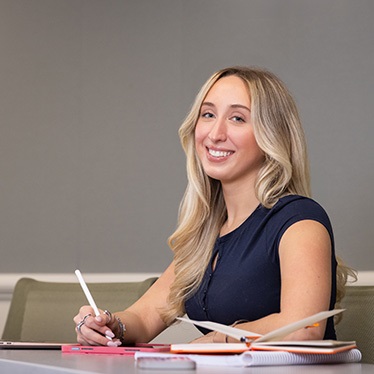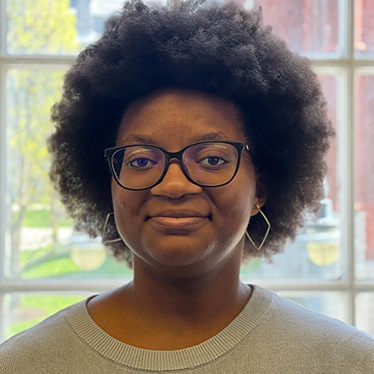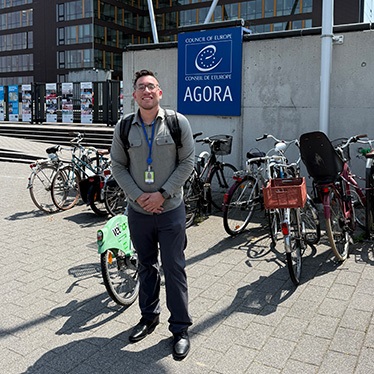
‘We Are Not a People of the Past’: Tenth Decade Project Builds Ties with Indigenous Community
May 14, 2024
A pair of Maxwell professors are helping to lead an effort to foster a reciprocal learning relationship with the peoples of the Haudenosaunee Confederacy.
Senior Isabelle Lutz joined a group of fellow Syracuse University students and community members for a short bus ride last fall to the Skä•noñh Great Law of Peace Center—the Haudenosaunee cultural hub on the shore of Onondaga Lake in Liverpool.
The evening’s event, part of a series called “Listen to the Elders," featured Onondaga Hawk Clan Chief Spencer Ohsgoñ:da’ Lyons speaking about the history of the Haudenosaunee Confederacy and sharing the traditional Thanksgiving address. The gathering included an array of Haudenosaunee foods, including three sisters soup made with corn, beans and squash.

We’re not a people of the past,” Lyons told the audience. “The Haudenosaunee are still the Haudenosaunee. We have our language; we have our songs.”
For Lutz, an enrolled member of the Oneida Nation in her home state of Wisconsin, the Skä•noñh event provided a chance to connect directly with Indigenous leaders in the Syracuse area.
“So much of Native American studies or Indigenous studies can be taught from a historical/past context, when the people, traditions and cultures are still present and active in the community,” said Lutz, who is majoring in political science with a minor in Native American and Indigenous studies. “So, when there are opportunities to attend and listen to members of different nations share their story and knowledge, it truly complements and enriches my classroom studies.”
The “Listen to the Elders” series began in 2022, organized by a University group called Not in the Books which fosters a reciprocal learning relationship between the University community and the peoples of the Haudenosaunee Confederacy.
The Maxwell School is strongly connected to the effort: two of its faculty members, Aaron Luedtke and Heather Law Pezzarossi, are among its key organizers, and it is supported with funding from the Tenth Decade Project, an initiative created 10 years ago in the lead up to the school’s 100th anniversary (see related story: From Sovereignty to Mortality: Tenth Decade Awards Support Research Across Disciplines).
“The Tenth Decade awards have energized and enabled interdisciplinary research around themes critical to the Maxwell School,” said Carol Faulkner, professor of history and Maxwell’s senior associate dean for academic affairs. “‘Listen to the Elders’ engages the Syracuse community around issues of citizenship, democracy and environment. It is a particularly appropriate project for our centennial because it highlights how our present obligations as citizens are tied to our past.”
Indigenous Ties
The work of Not in the Books aligns with the teaching and research of Aaron Luedtke and Heather Law Pezzarossi.
Law Pezzarossi, an anthropologist trained in critical heritage studies, does collaborative work that addresses colonial history while serving the contemporary needs of Indigenous communities, such as the Nipmuc people of New England. Her teaching includes courses on contemporary Native American issues, and on Indigenous museum relations and Native Americans. She is a faculty affiliate in the Native American and Indigenous Studies Program and a member of the advisory board for the University’s new Center for Global Indigenous Cultures and Environmental Justice.

Luedtke, an assistant professor of history at Maxwell since 2022, is also a faculty affiliate with the Native American and Indigenous Studies Program. He focused his graduate research at Michigan State University on the Native peoples of the Great Lakes—particularly, in his words, “how they used the authoring of their own histories as resistance to colonial erasure.”
The connections Luedtke has made with Syracuse-area Indigenous communities through Not in the Books and other projects are influencing his research direction.
“I have the privilege to build these relationships with Haudenosaunee elders,” said Luedtke, who is of Suquamish and Duwamish descent. “I am going to spend the rest of my career working in tandem with the Haudenosaunee to tell Haudenosaunee stories of resistance.”
The impetus for creating the Not in the Books group initially came from Diane Schenandoah, Oneida Nation Faith Keeper and the University’s Honwadiyenawa’sek—or “one who helps them.” A sculptor for 40 years, she earned an art degree from the College of Visual and Performing Arts in 2011. Her daughter, Michelle Schenandoah, is a graduate of the S.I. Newhouse School of Public Communications and an adjunct professor in the law school, and her son-in-law, Neal Powless, serves as the University’s ombuds.
As Honwadiyenawa’sek, Schenandoah offers intuitive energy work grounded in traditional Haudenosaunee culture and teachings to the University community. She also leads events such as a Haudenosaunee welcome ceremony opening the academic year and a monthly full moon ceremony.
“I was asked to be a Wolf Clan Faith Keeper in 1988,” she said. “As a Faith Keeper, part of my duty is to share our teachings of how to live in peace though gratitude. We have duties and responsibilities to one another as humans and to our Mother Earth for all that is provided. Giving thanks on a daily basis is of great importance.”
Through her initial work on campus, Schenandoah began connecting with Native students and professors who teach courses related to Native American and Indigenous studies, like Luedtke, Law Pezzarossi, and Patricia Roylance, an associate professor of English.
While students were clearly keen to learn more, many had little background on the impacts of colonialism and the dispossession of Indigenous lands, or on the persistence and current-day realities of Indigenous communities—topics rarely addressed in primary or secondary education.
“As Indigenous people, our history is so erased,” Schenandoah said. “Many students see the purple and white flag flying around campus but don’t really know what it is. You’re standing in the capital of the Haudenosaunee Confederacy. This is the birthplace of democracy.”
“We decided as a group very early on that we have a coherent job to do: to educate the campus community that Native peoples are not the mythological, ahistorical stereotype representations that people are accustomed to seeing. Native peoples are just as modern, nuanced, complicated and fully capable of all aspects of humanity as anyone else.”
Aaron Luedtke
assistant professor of history
Looking for ways to help fill this gap in knowledge and awareness of the area’s Indigenous heritage and contemporary presence—among not only students but also faculty and staff—Schenandoah hit on the idea of connecting the University community with a tribal elder. She contacted Freida Jacques, Onondaga Turtle Clan Mother Whatwehni:neh. Jacques agreed to do a series of lectures, and the Not in the Books team—named by Schenandoah—coalesced to organize these events at Skä•noñh.
In addition to Luedtke, Law Pezzarossi, Schenandoah and Roylance, the Not in the Books team includes Scott Catucci, associate director of outdoor education at the Barnes Center; Jim O’Connor, producer with the special collections team at SU Libraries; and Tammy Bluewolf-Kennedy, a member of the Oneida Nation’s Wolf Clan who leads Indigenous student recruitment in the University’s Office of Admissions.
“The Onondaga are still here, and the Onondaga reservation is minutes away from SU’s campus,” said Luedtke. “We decided as a group very early on that we have a coherent job to do: to educate the campus community that Native peoples are not the mythological, ahistorical stereotypical representations that people are accustomed to seeing. Native peoples are just as modern, nuanced, complicated and fully capable of all aspects of humanity as anyone else.”
Hosting the series at a Native cultural center, rather than bringing elders to campus, was important for the spirit and intent of the project. “Skä•noñh is a Haudenosaunee welcome center,” Law Pezzarossi said. “So, it’s the perfect place for people to start learning.”
Building Bridges
Supported with a $5,000 grant from Maxwell’s Tenth Decade Project and other campus programs, the “Listen to the Elders” series began in the 2022–23 academic year with four presentations by Freida Jacques, who in addition to being a clan mother has served for decades as a Haudenosaunee cultural liaison for educational institutions across New York state and beyond.

During these Skä•noñh events, Jacques led tours of the center and explained how in Haudenosaunee tradition, women choose the clan leaders and men marry into women’s clans rather than vice versa.
In one session, she discussed the enduring impact of the boarding schools run by churches or the federal government that tens of thousands of Indigenous children—including Jacques’ grandfather—were forced to attend between the late 1800s and the 1960s.
In a letter written to support a funding application, Jacques said that sharing her life experiences and knowledge has been fulfilling. “Both grandparents on my mother’s side attended Carlisle Indian Industrial boarding school in Pennsylvania,” she wrote. “My family was affected by this fact. My father was a Mohawk Wolf Clan person and originated at Akwesasne, whose territory is divided by Ontario, Quebec and New York state. …Building bridges between cultures appears to be one of my life’s purposes.”
Onondaga Chief Spencer Lyons continued the series in 2023-24 with presentations on Haudenosaunee traditions and governance. With free transportation available from campus to Skä•noñh, the “Listen to the Elders” series has consistently drawn capacity crowds.
Cameron Kline, a Ph.D. candidate in history and an advisee of Aaron Luedtke, has regularly attended and said the events add another dimension to his studies of early U.S. history. “Having an opportunity to speak with an elder is a privilege,” he said. “It adds a certain realness to the work that we do. We do sit on Onondaga and Haudenosaunee land, and it’s really important to recall that and have a better understanding of how we got where we are today.”
For Isabelle Lutz, who graduates this spring, the series has made it possible not only to connect directly with Haudenosaunee elders but to share her own background with non-Native students. “I have gone with friends,” she said, “and it is a great opportunity to introduce my culture to them.”
Heather Law Pezzarossi noted that students are not only participating in the series but spurring efforts to offer this type of learning opportunity in the first place. “We have lots of Haudenosaunee and Indigenous students at the University who are driving this interest in celebrating contemporary indigeneity,” she said. “They insist on it, which they should. They’re sitting in our classes, and they don’t want to be talking about indigeneity in the past tense all the time. They want to talk about right now.”
The series has inspired the Not in the Books team to extend their work into a documentary video project.
After presenting her series of lectures, Freida Jacques expressed interest in working with Not in the Books to record some of the oral history. “The level of trust we were able to establish with Freida organically blossomed into an opportunity to start video recording,” said Aaron Luedtke. “We took the opportunity to conceive of a larger project that will go into perpetuity: to build a living archive of traditional Haudenosaunee knowledge passed down orally and captured on video.”
To support this documentary project, which Jacques named “Dropping Seeds,” the team secured a second Tenth Decade grant for $25,000, Luedtke, Law Pezzarossi, Schenandoah, and SU Libraries’ producer Jim O’Connor are working with videographer Ruchatneet Printup on the project. Printup grew up with the Tuscarora Nation in western New York and, after a long career in New York’s nonprofit sector, earned a degree in film from the College of Visual and Performing Arts in 2023, at the age of 59. The first episode, featuring Jacques, is currently in post-production with an expected release later this year.
With this kind of archival project, control over the material is a critical issue, Luedtke noted, especially given the long history of exploitation and distrust between academic researchers and Indigenous communities.

“Historically, there’s been a lot of gatekeeping of Indigenous knowledge and heritage within the walls of the academy, which many Indigenous communities don’t have a lot of access to,” he said. “The crux of our project is relational and reciprocal. The Haudenosaunee elders will maintain ownership over the data. So as we’re building this archive of teachings and knowledge, the people we’re working with get to determine how it’s disseminated, who gets to see it, or what types of products are going to come out of it.”
According to the wishes of the knowledge keepers themselves, “Dropping Seeds” episodes may be produced, for instance, for the Onondaga Nation School, for use in classes at Syracuse or other universities, or for sharing with the public.
“We’re not boxing up Freida’s knowledge and keeping it for later for ourselves,” said Luedtke. “We’re recording it and saying, ‘Freida, what do you want to do with this? How do you want people to watch this? Who do you want to see it?’”
“So not only are we handing her the mic,” added Law Pezzarossi, “but we’re also handing the keys to the vault.”
Growing Relationships
The work of Not in the Books, Heather Law Pezzarossi pointed out, builds on a long history at Syracuse of fostering connections with the region’s Haudenosaunee heritage. “We're not starting fresh,” she said. “We’re building on important work. This is an ongoing relationship.”
A notable recent project is the podcast series “The Land You’re On: Acknowledging the Haudenosaunee,” a production of the SU Libraries’ storytelling initiative Access Audio. Jim O’Connor, a producer with Access Audio, worked with Neal Powless, Bianca Caiella Breed from Hendricks Chapel, and narrator Brett Barry to create the 12-part series, which features interviews with a wide range of Indigenous community members and allies.
O’Connor, Powless, and Barry also worked with Diane Schenandoah and Michelle Schenandoah to produce the video “Where Are Your Feet?,” intended as a short introduction for Syracuse newcomers to the region’s Haudenosaunee heritage and present-day community. Many students are now watching “Where Are Your Feet?” as part of their first-year seminars.
Looking ahead, the Not in the Books group plans to connect with other Native knowledge keepers for “Listen to the Elders” events, and to continue building the “Dropping Seeds” oral history archive.
“We see so much potential with what we’re doing,” Aaron Luedtke said. “Every elder that comes to talk either at the center or with the “Dropping Seeds” project gets to share whatever they want to share. And the more that can get out there, the more the public has a chance to understand.”
Luedtke hopes the efforts will have a snowball effect.
“We’re building relationships that are going to branch out and lead to more relationships. And we’re trying to build a culture of reciprocity and trust between our group representing the campus and Native groups in the Central New York area. Having investment from important individuals and elders within the Haudenosaunee community allows us to basically walk down the same path, which is to boost visibility and acknowledgement of Native peoples and Native issues.”
By Jeffrey Pepper Rodgers
Published in the Spring 2024 issue of the Maxwell Perspective
A PLACE FOR PEACE AND WELLNESS
The “Listen to the Elders” series has been held at the Skä·noñh—Great Law of Peace Center located along Onondaga Lake in Liverpool. Philip P. Arnold, associate professor of religion and a core faculty member of Native American and Indigenous Studies in the College of Arts and Sciences, is its founding director.
The center is focused on telling the story of the Native peoples of Central New York through the lens of the Onondaga Nation. The Onondagas, or People of the Hills, are the keepers of the Central Fire and are the spiritual and political center of the Haudenosaunee. Skä•noñh is an Onondaga welcoming greeting meaning “peace and wellness.”
Related News
School News

Dec 4, 2025
School News

Nov 25, 2025
School News

Nov 24, 2025
